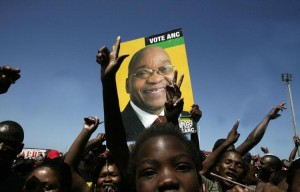The ANC, which has controlled the country since 1994, is facing its strongest challenge yet amid accusations that it has not done enough to alleviate poverty and provide services.
But many voters, who said they voted for the ANC, said they did it because they believe the party that defeated apartheid deserves one more chance.
The ANC is expected to win in the overwhelming majority of the country’s 278 municipalities. But the party is accused of being riddled with corruption and failing to keep up with the demand for decent housing, schools, running water and other basics.
That could be an opportunity for the main opposition Democratic Alliance, known as the DA, which has its roots in a white liberal anti-apartheid party, and has been hobbled by an inability to attract black voters. The DA is seen as pro-business, and boasts it has run an efficient administration in Cape Town, South Africa’s main tourist city.
Already, a chastened ANC has made changes, giving local communities more of a say in picking candidates. President Jacob Zuma also has promised that his national government will ensure that local governments perform.
A pre-election survey by South Africa’s Human Sciences Research Council found 45 percent of South African voters are dissatisfied with their local councils’ performances. But it also found that 37 percent would give the party they voted for last time another chance. Only 25 percent said they would change parties — and 19 percent said they would stay home.
In some ways, the ANC is a victim of its own success. Some 18 percent of South Africans live in state-built or -subsidized housing under a program the ANC started in 1994. Since 1994, access to electricity has increased from 36 percent of households to 84 percent, and the government has brought clean water to 6 million households.
For some South Africans, seeing their neighbors lifted out of poverty has brought hope they will be next. For others, it has sparked resentment and impatience.
Johannesburg and other metropolitan areas have seen economic growth, drawing South Africans from the underdeveloped countryside and people from elsewhere in Africa. Ivan Turok of the Human Sciences Research Council said that has led to a boom in shack settlements in the cities, creating frustrations and explaining “why protest action is concentrated on the margins of the big cities.”
The ANC has been praised for spurring economic growth, but the benefits have not trickled to the poorest of the poor. A recent U.N. study found three South African cities, including Johannesburg, to have some of the world’s widest rich-poor gaps. That was evident in Zandspruit, which sits in sight of mansions clustered around a nearby golf course.
Some 23 million voters were registered at 20,000 polling stations across this country of 50 million people for Wednesday’s vote, which election officials said saw relatively few glitches. After 12 hours of voting Wednesday, election officials said counting began immediately, though those in line when polls closed at 7 p.m. (1700GMT) were allowed to vote. Results were to be posted as they were tallied, with a clear indication of national trends expected by the weekend.
Political analyst Phillip de Wet said parties will be watching the results closely to learn lessons for policymaking and for the next national elections, in 2014.


